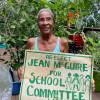Boston Mayor Michelle Wu told Boston Public Radio Tuesday she has signed a petition approved by the Boston City Council to allow 16- and 17-year-old residents to vote in municipal elections.
The council voted 9-4 to approve the proposal. Wu's signature sends it to the state Legislature, where it faces an uphill battle. If it does ultimately pass the Legislature, it will land on Gov.-elect Maura Healey's desk for a final signature before taking effect.
Wu said there are more factors to consider before throwing her support behind a similar effort to expand voter eligibility to non-citizen residents in Boston.
"In terms of legal permanent residents and immigrants who are not yet at full citizenship voting, there's a little bit more to see in terms of what comes out of the council process," she said. "That one is not formally before our administration yet.
"There are some more implementation issues to figure out," Wu added, noting that in general she believes "we should be trying to find ways to expand civic participation everywhere we can."
Wu also told Boston Public Radio that there are three things that keep her up at night: the transportation system, the state of Boston public school buildings and the situation at Mass. and Cass — the area by Massachusetts Avenue and Melnea Cass Boulevard that has longstanding issues with homelessness and addiction.
On why she opposes an elected school committee
"I believe very strongly that having accountability directly to the administration is really important," she said. "Particularly in this moment when we still have the needs from pandemic impacts, when we're still working through implementation of many of the new collaborative plan with the state around special education — fully changing our inclusion system, looking to rebuild school facilities, thinking about social-emotional supports. There's a lot that our new superintendent is running with.
"The most important thing for our team right now is stability," she said.
More Local News
Wu recalled a ceremony at the new Josiah Quincy Upper School building last week, when someone commented that the project took so long from inception to the ceremony that it outlasted seven superintendents, four mayors and "a whole lot of school committee members."
"We vowed that we wanted to do a lot more under one superintendent and one mayor, but I don't believe that this is the moment to change the governance structure," said Wu.
On the situation at Mass. and Cass
Wu reiterated her call for services at Mass. and Cass to be decentralized as a way to reduce the bottleneck of people coming to that area to seek help and then remain there, waiting for assistance.
"This is a challenge that is bigger than Boston. There are multiple systems that have failed here," she said. "If we can just tighten up those connections [to resources] in partnership with the state, a lot would be resolved on its own.
"We're not necessarily looking for 'X' number of dollars more from the state to address this situation in Boston," the mayor went on. "We believe the solution is for the state to invest this funding in communities all across the commonwealth to replicate what we know works, the programs that have been transformational."
A recent GBH News report found some critics say she's gone too far in her promise to "lead with public health, not criminalization" — with too much money spent on the unhoused and not enough on policing. But payroll data analyzed by GBH News showed that, under Wu, her administration has continued an already years-long surge of police overtime spending in the area.
In response to a question from co-host Jim Braude, Wu acknowledged the city has "not been hitting the right balance for a number of years in terms of the ecosystem of how all the pieces fit together."
But, she said police presence in the area has dramatically reduced the level of violent crime that was present a year ago, citing homicides and violent crimes.
"We solved a large part of it," she said. "The last chunk of it is very, very difficult."









